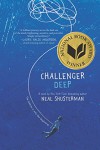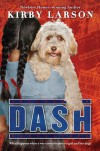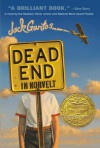Currently reading
Start Off Your School Year With: Sophomores and Other Oxymorons
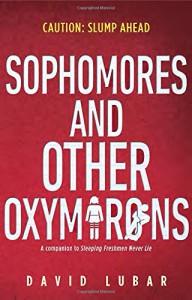
I've read several serious books recently about topics such as mental health and teen suicide. It was refreshing to meet Scott Hudson, hero of Sophomores and Other Oxymorons. Scott is a well adjusted, normal high school sophomore boy, the kind you want for your own children's friend. He's a little full of himself, like most sophomores, after having survived the perils and pitfalls of his freshman year. The biggest worry he has is whether and how to ask his best friend Lee for a date. Will this freak her out? Will it ruin their friendship? Scott is someone who overthinks everything, thus causing himself to dither about this and all other issues in his life rather than take decisive action on any front. As you might infer from the lighthearted tone of the book and this review, all ends well. Scott is a genuinely nice kid and you want to root for him and kick him in the pants with alternating zeal. Like most of us, he muddles through and manages to bring down some embezzlers and save the school newspaper as well as overcome his bad image in two of his classes, English and Biology. Like I said, all ends well. I am channeling Karin Porter and sketchnoting this book. Doing a profile of Scott's head seemed especially appropriate since he spends so much time inside his cranium, ruminating and fretting. It's a fun read for anybody who likes humor and YA books. It's tailor made for any English teacher who likes to teach writing with figures of speech, as Scott's grammar and creative writing teacher works to penetrate his somewhat arrogant skull.
I am channeling Dr. Karin Perry with her wonderful book sketchnotes. She uses iPad, though, and I am sticking with paper. Here's my sketch note:
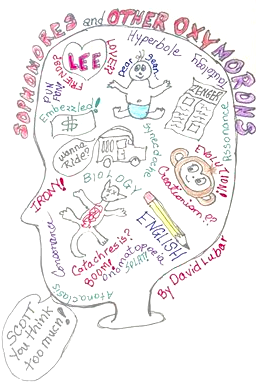
Another Great Pair of Books: Bone Gap and Unlikely Hero of Room 13B
By chance I again read two books concurrently that have lots of links one to the other. Of course this is often the case but it did enhance both of them for me. When I finished them both on the same day I was sad to let the characters go. In both books the main character is a very likeable teenage boy around the age of 16, who is dealing with conditions that cause both of them to stand out as different from peers and have even more than the usual problems getting through adolescence. AND both boys fall in love with all the bittersweet intensity of first loves. In Bone Gap, the problem is face blindness. I never knew there was such a disorder but look it up even if you don't read the book. It is very interesting and causes problems throughout life for people afflicted. The protagonist in 13B has a problem to which most of us can relate...OCD. I think our crazy world makes everybody a bit OCD, and I know I have my quirks. But poor Adam has it in spades. He also has an even more messed up mother and a slightly less messed up but needy little stepbrother. The whole combination is a huge mess and poor Adam tries to fix everybody's problems as well as his own because that is his nature. He also worries about his first love, and fellow OCD therapy group member, Robin. This story has some hilarious as well as poignant moments and will absolutely bring out your OCD tendencies. It made me think about the fact that mine, while minor, are also pretty silly and I should not let them bother me much. I started listening to it in the car driving to San Marcos and had to pull over TWICE to check to see if I had everything, even though I knew deep down I did. This is one of my "favorite" quirks. If you have a friend or loved one suffering from serious OCD, this book will give you insight into the difficulties that presents. But with all this, it's a darn good story!
A major difference between the two books is that Bone Gap has a touch of magic that causes the strange occurrences that complicate the lives of Finn, his brother Sean, and their two true loves, Petey and Roza. If you did not notice already, this book is by Laura Ruby, author of We Were Liars. That should tell you from the get-go that it's gonna be good. I like it just as much, and find both stories memorable.
Ahhhhh you say....trivial YA books. I only read books for ADULTS. Well go ahead with your fine sophisticated self and miss some of the greatest stories around. YA books rock! Remember Number the Stars??? I'm just sayin'...
Two Great Reads: Call Me Home and The Alex Crow
I just finished two memorable books in two days. They are both titles I recommend wholeheartedly, and while they are quite different, they have one thing in common. In both books, there are parallel stories with different points of view that run along side one another, with the result that the reader wonders how everything can be reconciled at the end. And then, without the slightest feeling that things are contrived or forced, everything falls into place and one is left with a sensation of… WOW!
The first title was another book by Andrew Smith solidifying the fact that he is an unusually imaginative and creative storyteller. Many authors turn out stories that have a similar style if not theme. That is certainly not so for Smith! In the past couple of months I have read Winger, 100 Sideways Miles, Grasshopper Jungle, and The Alex Crow. In no way does one resemble another, and in these days of sequels, prequels, and spinoffs that is refreshing. If you have read Grasshopper Jungle and have not yet picked up The Alex Crow, you are in for quite a treat with another story that takes your imagination for a wild ride with a mix of humor, pathos, sci-fi and guy reader delight. My favorite theme to take away from the book is the inestimable value of stories. As the young protagonist Ariel says, we are all walking libraries, chock full of stories. Passing them on does not diminish them, but gives them continued life.
The second book is Call Me Home, by an amazing young writer whom I have been privileged to call friend for a number of years, Megan Kruse. Nobody ever said life is easy, and this book embodies that truism. It is a story of family violence, set mostly in Kruse’s home state of Washington, and the rain forest’s dark shadows make the setting as important as the characters. Happily for me the story ends in Texas, and in the part of the state that I call home. Megan spent several years in the San Marcos area and it is clear that she was soaking up the flavors of this region during that time. The different viewpoints in this book are those of a mother, Amy, and her two children, son Jackson and daughter Lydia. They all struggle to survive physically and emotionally in a home where family violence is a daily threat if not reality. As the children mature and the violence increases, tension mounts. Jackson, the son, must find his way in the face of his future as a gay male in rural Washington. Meanwhile his sister Lydia is approaching adolescence and their mother, Amy, is trying desperately to find a way to build a future for them all. As is often the case, making a break from the abusive father is a time of great danger and tension. Bringing all the tension to a satisfying conclusion is no small feat, and Kruse succeeds magnificently.
Both these writers have something in common as did the two books I just read. Their commonality is that you are going to want to be on the lookout for whatever comes down the pike from each of them in the future. I am just as confident you will not be disappointed as I am in highly recommending both The Alex Crow and Call Me Home.
 1
1
Hellhole is a Simultaneously Weird, Funny, and Awful Read.
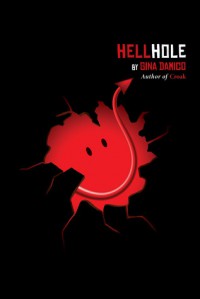
I was looking for a change of pace and definitely got it with Hellhole. Max Kilgore is stumbling through adolescence with a trifecta of issues: he's hopelessly nerdy and socially inept, his mother is dying from heart failure, and the devil has taken up residence in their basement. The story has plenty of dark humor with some pretty awful events thrown in. The book is clever, funny, and satisfyingly weird. I would say it's a good match if you like fantasy with some ridiculousness and humor as well as evil thrown in.
Tandem Coming of Age Stories: Althea and Oliver

Two lifelong friends with shared childhoods must navigate coming of age and the inevitable challenges to their relationship. The complicating factor is that they are boy and girl. My best childhood friend was a boy also, so I connected with this pair. Growing up is hard enough, but a frightening illness affects them both. This book gives insight about KLS, or Kleine-Levin Syndrome, which causes Oliver to fall into long sieges of deep slumber, lasting weeks at a time. Althea must find a way to reconcile her deepening feelings for him with the fact that they are not exactly mutual, and also deal with managing to go on in the face of his illness and absences. By the end of the book both characters have learned a great deal about KLS, their relationship, and their unfolding futures. I liked the ending, which is open to interpretation and also offers hope for both of them.
Remarkable Book about the '60's
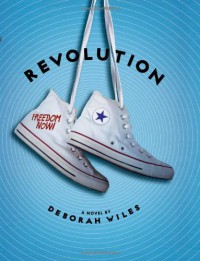
This is one of the most remarkable books I've read this past year. It is actually two books in one. Interspersed within the storyline are primary source documents...songs, speeches, letters, news accounts, interviews, etc. The two parallel narratives are about the years 1964-65 in Greenwood, Mississippi, known as Freedom Summer. It's not a pretty story, reminding us of the racism, violence, hatred and fear of those days. It's about the work of COFO, and SNCC particularly, along with NAACP in the state of Mississippi. The historical documents take us back to the three young men killed on the first official day of Freedom Summer, the peaceful protests punctuated with arrests, beatings, and economic reprisals of that time and place. It's about the South's refusal to honor laws such as Brown vs. Board of Education. It's about the repression of voting rights, a concern that's back in the news today. The fictional story follows two white youngsters, stepsiblings, trying to make sense of the times. Their story is intertwined with that of a "colored" boy also trying to navigate the trying times.
At this time in our country when racism, voter repression, fear tactics, and other issues seem back in vogue for far too many people in too many places, this book is a reminder to the rest of us that we need to be brave and speak out. And that is something I am going to do, even at the risk of offending some "friends."
It is billed for teen readers, but I can attest to its impact upon an adult who lived through the '60s. I enjoyed a double dose because I had the good fortune to have access to both the print copy and the audiobook. I strongly recommend the audio, and if you can get your hands on it at a library, get the print and audio both. Also, I believe this book should be held in both formats in any library that serves teen readers. If I could give it an award I would.
PS I have not read the first book in Wiles' 60's Trilogy, this being the second. I will snag it ASAP. If you remember the '60s you might want to do the same.
Cannot Wait to Get My Hands On This Book!
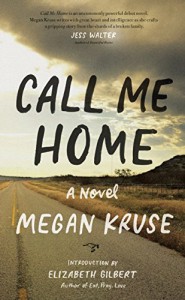
It's not coming out until spring 2015, but I am posting now to encourage people to be watching for it. Call Me Home is an amazing story of about a troubled family whose members struggle to come to grips with abuse, trust, betrayal, sexual identity, and finding ways to endure through hard times. I have read a very early version of this book by my talented and very special young friend, Megan Kruse. The main thing I remember from that reading was the unforgettable characters. I am beyond excited to see the final version come out and get a copy in my hands to read and share. Keep an eye out for this book! It's a great choice for anyone who likes contemporary realistic fiction. It's written for adults, but mature teens will like it too.
If you liked Diary of a Part-Time Indian...
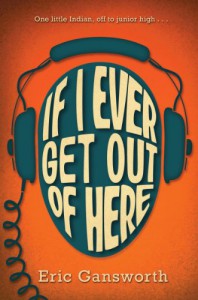
I listened to this audio book, which I confess I picked up because it sounded like another
"Part Time Indian." It was a bit of a hard listen at first, partially because of the bleak tone of voice of the author/reader, and partly because of the initial description of Lewis' life of deprivation at home and bullying at school. All the same, I am glad I stayed with it. Things definitely pick up as the book moves on and Lewis makes an unlikely friend in George, an Air Force kid. By the end I was cheering for both boys and wishing I could know how their lives continued to unfold after the very touching ending. Recommended as YA, but I think anybody who is interested in reservation life and coming of age stories will find this book a rewarding read. I know it's one story I will remember.
Touching Story About Adoptions Abroad
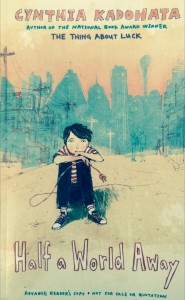
Jaden was already four or five when he was adopted by his parents through an agency in Romania. He is haunted by his traumatic early childhood and feels he is a failure as a son to his adoptive parents. Now his folks plan to go to Kazakhstan to adopt another child. Jaden wonders if they want to replace him with this new addition to the family, this time an infant. This book is very touching and also sheds light on foreign adoption in remote countries. The agency Jaden's family uses is shady and breaks promises, but the family's desire to make the adoption work overcomes problems encountered. If this is the way of some adoptions, it is certainly an uncertain path to follow. The book targets young readers but I think it is a quick read, moving and also informative, for any interested reader.
National Book Award? REVOLUTION by Deborah Wiles. Don't miss it.

I am currently reading this book with my ears AND by hard copy. This is a book where you want BOTH. I am so grateful that Karin Perry put both versions in my hands last week. This is about Summer 1964 in Mississippi. It is an important book for readers of all ages. The audio allows you to hear the text of publications, speeches, songs, etc. aloud, While the print version lets you see them on paper. I cannot think of another book I've read this year that is more deserving for its category. Get it. Hear it. Read it. You won't be sorry, especially if you remember 1964. I'll post again when I finish. I am so impressed by this book that I cannot wait to talk about it until then.
Another Memorable Book about the Holocaust
I just finished this book about a young Jewish girl who was sent along with her family to a prison camp. It describes her life as a prisoner and also depicts life in the Commandant's house where she is compelled to play piano. This along with The Extra. Both books will be excellent additions to any secondary school or public library. They are worthwhile reading for adults too, and by no means sugarcoated for young readers. We all need to remember the past and continually push to avoid terrible historical events from being repeated, especially in this troubled time in our country.
Fascinating Read for All Ages: The Extras

I feel sure that few people have heard about the circumstances described in this memorable book. It is not surprising that Kathryn Lasky has brought to life a courageous young girl caught up in the horrors of the Holocaust, given her many past well researched historical novels. This book teaches a great deal, and it shines a light on the story of the so-called Gypsy Plague which resulted in thousands of Gypsy and Romani people meeting the same fate as Jewish captives during Hitler's reign. I was aware that Gypsy people had been persecuted, along with gays and others as well as Jews, but not of the scope. Leni and her parents had a comfortable life in Vienna before their arrests. A great deal of the story centers around a reprieve of sorts when Leni and her mother, along with other Romani, are selected to be extras in a movie by the famed German actress, Leni Riefenstahl. I learned a great deal about her, about the Nazi treatment of Gypsies, and about this unique situation. The book is for young readers, but the information is such that I recommend it for adult readers as well.
Two Fun Mysteries for Tween/Teens
I had the good fortune to pick up these two books from my colleague Karin Perry's office book case. One was in paperback and the other was audio, which meant I was reading them concurrently. The thing that was so cool was that both books have similar premises, being mysteries with supernatural twist. It is almost like two people were given the challenge of writing a mystery in which a spunky teenage heroine finds herself in great danger with the added complication of ghostly involvement. They both take place in iconic settings with historic and haunting pasts. Famous Last Words takes place in LA, and the setting for The Name of the Star is London; and the history of famous killers from the past catches up with both girls. I confess to being a fan of mysteries who seldom figures out whodunnit. In both cases there were lots of clues but each ending had a nice twist to finish the story nicely. I also wonder if there's a chance of seeing both of these main characters in future mysteries. I hope so! If you have a tween/teen reader in your life, read these books with her. You'll both have a good time!
Blind by Emily DeWoskin--Memorable read for YAs and adults too.
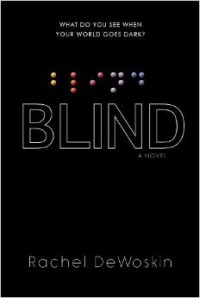
When I grew up I did not have much reading guidance, and the choices of good books for young readers were far fewer than they are today. Somehow I got lucky and came across a book I never forgot, Follow My Leader by James Garfield. I am often deeply affected by what I read, and after reading this book several times, I became suspicious that I might go blind someday and have the same challenges that Jimmy faced. I remember practicing walking down the sidewalk near my grandmother’s house with my eyes closed, imagining what it must be like to be sightless. In the story, Jimmy is blinded when a firecracker goes off in his hand and as a young boy facing his teen years has to learn how to do even the simplest things all over again. After a difficult time, he begins to work with a guide dog named Leader. This relationship and his growing confidence help him adjust to his new circumstances.
Fast forward to 2014 and I just finished reading Blind by Emily DeWoskin. One reason I picked it out was because the blurb brought back to me memories of that special book I read as a child. The main character, like Jimmy, loses her sight when burned by fireworks on July 4. At 15 she is plunged into darkness, not just physical but mental and emotional as well. Her difficult year is further exacerbated by the death of a friend who is believed to have committed suicide. Emma begins to wonder what good can possibly be in story for her in the future after such loss. Her best helper is Spark, her companion dog. Emma narrates the story in something akin to stream of consciousness, which at times got a bit tedious. Since I listened to the story, I could not skim those repetitious parts and there were times when all the reporting felt tedious. All the same, it gave me great insight into all that is involved in acclimating to a dramatic life change like losing one’s vision. This book would be a great read for anyone who has impaired vision or who wants to help a family member or friend in such a situation. It is another YA title that I think could be read and enjoyed by my adult reading friends as well as younger readers. Anyone who read Follow My Leader will find the similarities striking and both books equally rewarding reads.
This post is running very long but I have to add another thing that made this book special for me. Back as a very young teacher, I was selected to work with a 7th grade girl who was returning to public school after several years at Austin School for the Blind. Like Emma, she lost her sight as a youngster. In her case, it was due to a viral infection. Her story was so much like Emma’s that it was striking. She went through a very hard time adjusting and at the time I knew her she was still not happy about using Braille. I recorded things for her. She had an attendant, as did Emma. No dog. She memorized the steps between classes and while she had a cane she did not use it in the building. She wanted very much to blend in with the other kids, who had been her friends when she was sighted. Like Emma’s mother, Shele’s was very protective and, I suspect, felt guilty though this was out of her hands. I kept up with her for a number of years. The last time she wrote me she had been diagnosed with MS. She was taking college courses and trying to make new adjustments. Frankly I have to wonder if she is still with us. I cannot find her on the Internet beyond her high school yearbook, and her name is fairly uncommon. Reading this book made me remember again how much I learned from her. Does anyone know a Shele Hooley who used to used to live in Arlington, Texas? I would love to get in touch with her or with her mother. Shele would be in her 50’s now.
PS I checked Amazon reviews of Follow My Leader and found this wonderful entry. I had not realized until just now that this book was autobiographical. Here is what James Garfield’s granddaughter shared:
I'm James Garfield's granddaughter. He dedicated the book to my mother, Carolyn Lazarus, who is now 81 years old. My granddad lived to be 102 years old, living half of his life blind. He had a seeing eye dog, Coral, a golden retriever who was the sweetest animal I've ever met and she was so very attentive to him. He would have been very flattered to read these reviews so I thank all of you who have taken the time to write about Follow My Leader.
 1
1
Amazing Book! 2nd Wonderful Story Written in Verse! Don't Miss This One!

I am so lucky to have access to an ever changing selection of great books! Thanks to Teri Lesesne for loaning this one to me before she even had a chance to read it. I am struck by the variety of formats in which a book can be written. Death Coming Up the Hill was written in haiku, which worked very well for that compelling story. Now I got to enjoy Brown Girl Dreaming, beautifully written in verse. Interestingly, both of these titles take the reader back to the 1960's and would be great additions to any study of that decade. Since I remember the '60s quite well, the settings in both resonated especially with me. Jacqueline Woodson's book is a story of her own growing up years, spent partly in the South and partly in New York, specifically Brooklyn. Anyone who has read other titles by her will have an additional reason to love this book. Brown Girl Dreaming is already getting lots of attention, and rightly so. I recommend this book, a quick read, without reservation to my adult reading friends as well as to all who love YA literature. Don't miss this one!
 1
1
Wow!

I just finished the audio of this book. Wow! If you like suspense, go out of your way to get your hands on this story. If you click on the cover you can read the first seven chapters free. If you're not hooked I'll be surprised. I have often wondered what it must be like to live in one of those communities of people who cut themselves off from the rest of the world. As a Texan I have vivid memories of the Waco incident and I've always wondered about the people who follow a leader like Koresh. This story provides a window. The plot moves along with building suspense and tension to a dramatic ending that has a little bit of a surprise along with the expected. The little surprise is, I'm sure, why there is going to be a sequel. I will HAVE to read it! This is not a book for young teens, but it is one that adults will enjoy as well as older teens.
 1
1
